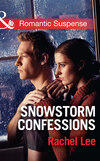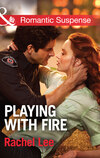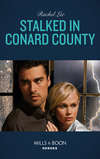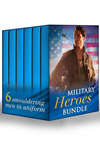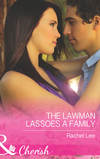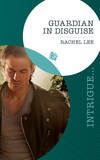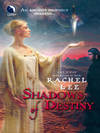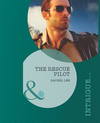Loe raamatut: «Undercover Hunter»
In this story from New York Times bestselling author Rachel Lee, two investigators must learn to play nice before it’s too late
Detective Cade Bankston never had any luck with female partners. So when he’s assigned to work with feisty, raven-haired DeeJay Dawkins, he isn’t pleased at all. Posing as a married couple, the investigators must team up to catch a killer. That is, if they don’t kill each other first.
Putting their mission first proves tricky as mutual disdain evolves into mutual desire. But distraction is not an option. The killer who seemingly vanished five years prior has returned to Conard County, Wyoming, to finish what he started. And he just set his sights on two new victims.
“Well, we know where it ended. The question is where did it begin?”
“We aren’t going to figure that out now.” DeeJay turned, and as she did so, her boot caught on something, maybe a root, and she started to fall.
Instantly, strong arms caught her and the next thing she knew she was pressed against Cade’s chest. Layers of down prevented it from being in any way intimate, but when she looked up into his eyes, no amount of down could prevent the hot arc of hunger that speared through her.
A flare in his gaze seemed to answer her.
“Cade?” she said breathlessly, the question almost lost as the treetops stirred in a sudden wind. It didn’t matter. She didn’t know what she was asking anyway.
“Damn,” he said quietly. Apparently he knew the answer because he leaned in and kissed her.
***
Dear Reader,
Falling in love is one of the biggest risks we take in life. It’s the emotional equivalent of jumping out of an airplane without a parachute and trusting your jump partner to catch you and carry you down. When we’re young, we leap into it with joy. When we get a little older, if we’ve had some bad experiences, we’re not as quick to take that leap. Maybe we refuse to take it again.
But at the root of love is trust—trusting someone enough to be utterly vulnerable to them, because when we truly love we become emotionally naked. All the walls are down, all the defenses lowered. With a single word or act, we might be devastated.
DeeJay and Cade both have reasons not to trust, DeeJay more than most. But when they are partnered to help catch a serial killer, those defenses must be breached. As partners they must rely on one another completely, and that reliance requires the first seeds of trust. Preoccupation with the case gets them through at the beginning, but in the end love saves them both.
Enjoy!
Rachel
Undercover
Hunter
Rachel Lee

RACHEL LEE was hooked on writing by the age of twelve and practiced her craft as she moved from place to place all over the United States. This New York Times bestselling author now resides in Florida and has the joy of writing full-time.
MILLS & BOON
Before you start reading, why not sign up?
Thank you for downloading this Mills & Boon book. If you want to hear about exclusive discounts, special offers and competitions, sign up to our email newsletter today!
Or simply visit
Mills & Boon emails are completely free to receive and you can unsubscribe at any time via the link in any email we send you.
Contents
Cover
Back Cover Text
Introduction
Dear Reader
Title Page
About the Author
Prologue
Chapter 1
Chapter 2
Chapter 3
Chapter 4
Chapter 5
Chapter 6
Chapter 7
Chapter 8
Chapter 9
Chapter 10
Chapter 11
Chapter 12
Chapter 13
Chapter 14
Chapter 15
Extract
Copyright
Prologue
Calvin Sweet knew he was taking some big chances, but risks always invigorated him. Coming back to his home in Conard County was the first of the new risks. Five years ago he’d left for bigger cities because the law seemed to be closing in on him.
Returning to the site where he had hung his trophies was a huge risk, too, although he could claim he was out for a hike in the autumn mountains before the first snows fell. There was nothing left, anyway. The law had taken it all away, and the sight filled him with both sorrow and bitterness. Anger, too. They had no right to take away his hard work, his triumphs, his mementos. His boys. He knew his mother would be proud of what he’d done, but the proof that he’d appeased her was gone.
They’d taken it all away. After five years all that was left were some remnants of cargo netting rotting in the tree limbs, the remains of a few sawed-off ropes.
But he could close his eyes and remember, and remembering filled him with joy and a sense of his own huge power, the power to purify them forever. Calvin had saved them.
Unlike his boys, he was filled with great purpose, a purpose handed down to him by his mother.
From earliest childhood he had been fascinated by spiders and their webs. He had spent hours watching as insect after insect fell victim to those silken strands, struggling mightily until they were stung and then wrapped up helplessly to await their fate. Each corpse on the web had been a trophy, marking the spider’s victory. No one ever escaped.
No one had escaped him, either.
But his boys were gone, carried away to a different fate on cold slabs and cold holes in the ground. Honored no more, at least not by him.
He stood for a while, remembering, then turned to begin the trek back to the ranch. A small ranch, left to him after his mother’s death long ago, but it was isolated enough to pursue his calling, and without his mother around it would be even more private. He considered it a bonus that construction at the new ski resort had begun. An influx of people for the jobs made his return even less remarkable.
These past years, moving from city to city before he could be found, he’d had to give up a lot of his boys, which had left him feeling incomplete and unsatisfied. Certainly there’d been no spiderwebs. Well, he could rebuild his triumphs here. Not in the woods, perhaps, since they’d found his first group, but maybe in the barn loft, out of sight? He needed to think about it.
He really wanted his web again, his carefully preserved trophies. He wanted what every spider wanted, and he’d find a way. The need was growing stronger. He needed to act again, and he needed to honor those who sustained his soul. He also needed to carry out his mission of purification. Sometimes, though, he lost track of what mattered more: his mission or his need. In those moments, he felt a little confused, but eventually he righted himself.
A cautious part of his mind warned him to wait a little longer, to make sure his plan would work. Soon that voice would give way to the compulsion that filled him, making the whole world seem luminescent, especially the chosen one.
But for now he suppressed the need. He wasn’t stupid. In fact, he was quite smart, as proved by the fact that no one had come for him yet. He knew he was committing crimes. He just didn’t care. His mission was bigger and more important than mere mortal laws.
He was himself chosen, just like a spider, to be exactly what he was.
Chosen. He liked that word. It fit both him and his boys. They were all chosen to perform the dance of death together, to reach the ultimate purity. To sacrifice the ordinary for the extraordinary.
So he quashed his growing need to act and focused his attention on another part of his life. He had a job now, on the crisis hotline. Calvin had worked at them before, which had gotten him a job almost the instant he walked in the door. Five evenings a week for four hours he answered telephones and talked with distressed people: victims of rape, of domestic abuse, and the ones who interested him the most, the desperate boys.
He was whistling now as he walked back down the mountain to his truck. A spiderweb was beginning to take shape in his mind, one for his barn loft that no one would see, ever. It was enough that he could admire it and savor the gifts there. That he could bask in the purity of his successful missions.
The impulse to hunt eased, and soon he was in control again. He liked control. He liked controlling himself and others, even as he fulfilled his purpose. Self-control was everything, as his mother had often reminded him.
Like the spider, he was not hasty to act. It would have to be the right person at the right time, and the time was not yet right. The right times were coming to him more often now as he grew in strength.
But first he had to build his web.
Chapter 1
In January beneath a leaden sky, special agents Cade Bankston and DeeJay Dawkins rocketed down an empty state highway toward the town of Conard City, Wyoming. They had been summoned to find a serial killer.
Cade had been to Conard City a few times years ago, very briefly, and had found it unremarkable but pleasant. DeeJay had never seen it. Given her background, he wondered how she would react. But then he couldn’t figure out what the hell a woman with her past was doing working as a criminal investigator for the state of Wyoming. As a former military cop for an elite MP unit, she should have had her pick of jobs.
Maybe it was that prickly nature of hers that caused her problems. Certainly they’d had a few near-fights over the past three days, and they’d only just been made partners. If there was something, imagined or real, for DeeJay to object to, then she seemed to find it.
The red car they were driving was kind of sporty for the country, but that was the idea. To look like outsiders rather than insiders. To act as cover for a couple of investigators pretending to be married travel writers.
That “married” was still the biggest bone of contention between them. Not that it had been their decision. Nope. None of this had been their decision, and if they could just wrap their heads around that part, maybe the spats would ease up.
He kept his attention on the road. Snow blanketed the open spaces around them, although it was still a thin blanket. Plenty of brush stuck up through it, and tumbleweeds tossed like agitated prisoners against the barbed wire that had snared them. If there was life out here that was mobile, it had found somewhere to hide. Even the ranch houses were invisible from the road, although occasionally a sign pointed the way or smoke from a woodstove signaled in the distance.
He glanced at his companion. Well, okay, partner. He’d never wanted another female partner again, but that was a subject he wasn’t about to explore again, now or later. He just didn’t like it and didn’t want it, had learned it contained huge pitfalls. Now here he was with a woman stapled to his side for the duration.
She’d have been pretty enough if he hadn’t already discovered she was a prickly pear cactus with enough sharp spines to leave a man in ribbons. Inky black hair, high, wide cheekbones that bespoke some Native American ancestry, a straight nose that was just right for her face and a mouth that, damn it, looked like it was begging for a kiss. Even when it was compressed in disapproval, which it often was as far as he could tell. And that inventory didn’t even get to her figure, a great figure for someone who was in the peak of physical conditioning, which she clearly was. He liked women who were fit.
He clapped his eyes back on the empty road and schooled his thoughts to a safer area. The woman in the passenger seat was off-limits, no caveats, no exceptions. And she was probably still stewing because he was driving.
That had been their first disagreement of the day. Just the opening salvo. The next battle had ensued over the choice of radio station. He liked country music while he was driving. Turned out she liked NPR. Now why would that surprise him? Thing was, when he was driving he preferred to escape into fantasies about losing the woman, the truck and the dog rather than listen to real-world discussions that usually riled him up because he mostly didn’t like the way the world was going these days.
So no radio at all. Some compromise.
Then there had been the disagreement about where to get coffee. Crap, that beat it all to hell. She wanted the expensive place; he’d have been happy with any roadside diner. So he took her to the chain coffee shop and then she’d ordered ordinary coffee. Not a fancy drink, just a gigantic cup of black and strong. Same as him. So why the argument?
He hoped they found this serial killer soon, preferably before one of them killed the other in a shoot-out at high noon.
“I need to eat,” she announced. Her first words in 250 miles.
Not we need to eat. No, just announcing her own wishes. Of course, maybe she was used to that. He’d heard she’d been an officer, kind of way up there or something. Maybe she said jump and was used to having everyone do it. Well, he wasn’t used to jumping and wasn’t about to begin.
“You see a place to stop?” he asked mildly enough. Not exactly a courteous response on his part, and even he knew it. But he figured if he gave DeeJay Dawkins an inch, she’d take a country mile.
“Next place,” she replied.
“Greasy spoons from here on out.” He hoped she’d object to that. After all, she was the type who went to specialty coffee shops to get ordinary coffee. Next he’d be hearing about organic food restaurants and how she lived on fresh salads.
She shocked him by saying, “Fine.”
Man, the conversation in this car was a real crowd-pleaser. The thought of having to share a house with her until they finished this investigation made him want to change jobs. Except he mostly liked his job, so he wasn’t going to let anyone, especially her, make him throw it away.
Focus on the job, he reminded himself. Not the partner. They were after a serial killer, or at least the local sheriff thought so. One who was taking adolescent boys. No bodies yet, but apparently it had happened a few years ago, too, then abruptly stopped. They didn’t find the evidence until later. Much later. Now the sheriff feared it was starting again.
Not unusual. Some serial killers were fairly smart. They often changed locales and evaded the law until they died. Or they went to prison for a while for some unrelated crime and their trail went cold. If the sheriff was right, they couldn’t hope for a stupid killer this time, because that would be a really idiotic assumption on their part.
It had happened before; now it was happening again, and half a decade was a long time for a copycat to suddenly show up. Ergo, it had to be the same creep.
Around a tight bend in the road, settled into a hollow almost out of sight, he spied a roadhouse. One of those places that somehow hung on in the middle of nowhere, serving people who lived too far from a town to want to make a lengthy trip for a drink, some socializing and a lousy sandwich or overcooked burger.
Without a word, he flipped on the turn signal and nosed them in. Only a couple of dusty pickups sat in the gravel lot, but the open sign blinked red neon at them. Rusty, ancient-looking signs announced beer, food and cigarettes. Sort of an outdated convenience store, except there’d be a bar. There was always a bar. He just hoped the place didn’t house any trouble right now. He and DeeJay, dressed in brand-new Western clothing and boots to fit their assumed roles, might as well be wearing neon signs of their own: dude alert.
He climbed out and waited. DeeJay followed a moment later. He’d already learned not to open a car door for her, even though they were supposed to look married. He hadn’t fought that one much, though, except to annoy her.
She came to the head of the car, and he watched her size up the place with experienced eyes. Then she glanced at him, and her dark gaze seemed to say, We can handle them.
Yeah, they could. If it became necessary and it probably wouldn’t. He wondered how many times in her career as an MP she’d had to walk into places like these, probably a hell of a lot more crowded with drunks. Maybe not much, if she’d been an officer. How the hell would he know? She wasn’t talking, and he was damned if he would ask.
When they reached the battered door, at least she didn’t argue about him opening it. He was on the left. He’d have let anyone on the left open it given the way it swung. He walked in behind her and took it all in, familiar from countless places in the past. Wood everywhere, darkened, stained and scratched by the years. A long bar, also scratched and stained, stools that had needed to be replaced forty years ago, the stench of stale alcohol, tobacco, sweat and other things he didn’t care to pick out. No scouring in the world would get rid of those odors now.
The jukebox was wailing some bluegrass, the bartender, maybe owner, looked like a leftover from gold-rush days. A number of old men gathered at a corner table, watching them suspiciously.
DeeJay took one look around, then strode up to the bar as if she owned the place. Cade stayed by the door. The Native ancestry stamped on her face could still cause problems in some parts. He waited to see how she’d be received.
“Coffee,” she said to the bartender, “and a menu. Please.”
The gray-bearded man hesitated only a moment, his old pale eyes darting to Cade, then he grabbed a ceramic cup from the stack on the counter and filled it from what looked like a fresh pot. He carried it to DeeJay, then slapped down a plastic-covered menu that was probably sticky. Weren’t they always?
Cade meandered over to take a seat by DeeJay. The bartender had issued the message We don’t want no problems here.
Good enough for him. He ordered his own coffee, and agreed silently with DeeJay that a burger was probably the safest thing to choose, not that the menu was big. Soon the smell of frying beef rose from the griddle and it was like someone let the tension out of the room.
Lunch without problems. Always a good way to go.
Then DeeJay astonished him almost to speechlessness. She lifted her head from her burger and said, “This is a great burger. Just the way I like them.”
The bartender froze and stared at her. He probably received a compliment once every hundred years or so.
DeeJay pushed her jacket out of the way, reached into her hip pocket and pulled out one of the phony business cards they had for this trip. “We’re travel writers,” she said. “We write about great places to stop. If you have a card, I’d like to tell folks about your burgers.”
Now the bartender’s jaw dropped. Silence fell from the far end of the room, except for Hank Williams Sr. wailing tinnily about cheatin’ hearts. You could almost hear the ice in the room crack as it thawed.
“Ain’t got no card,” the bartender said. “Take one of them menus, iffen you want.”
“I’ll do that,” DeeJay said. “Thanks.”
For her efforts they both received a complimentary piece of apple pie.
Cade let DeeJay pay, figuring this wasn’t the time or place to get into an argument about who was buying lunch, and it was all the state’s money anyway. When at last they stepped back outside, he drew in lungfuls of fresh cold air and remarked, “Great job.” He didn’t even sound grudging.
“The pie crust was heavy,” she remarked, her only response.
Stifling a sigh, he climbed back in behind the wheel and set them once again on the road to Conard City.
However long it took to catch this killer, it was going to be too long.
* * *
DeeJay didn’t care for men. It was one thing to have a fling with one, another to work with one. In a single instant she’d seen the resistance in Cade Bankston’s eyes when he’d heard they were to be partnered, and that had been all she’d needed. He was a macho meathead who couldn’t accept that women were as capable as men. Like that pinheaded CO who had turned her life into a living hell because he didn’t think a woman was qualified to command an MP unit. That freaking martinet had wanted every i dotted, and it damn well better be dotted clearly enough. But he wasn’t the only one. There’d been the CO in Afghanistan who’d warned her that if she filed a rape charge her career was over. And the series of them who had been infuriated when she insisted on investigating the rapes of other soldiers. There’d also been too many men working for her who didn’t get why they should take orders from her. And then there’d been the guy who had forced her out.
They hadn’t all been bad, but enough of them had that DeeJay had a real burn on for men. A guy got one chance with her. Bankston had torched his.
Still, she had to work with him. She wasn’t ready to nuke any bridges on this job. There was a killer to catch, although she still didn’t understand what lamebrain had come up with the idea that they had to pretend to be married. Wouldn’t it have been enough that they were working together on a travel story?
She looked down at the thin gold band on her ring finger, courtesy of an evidence locker somewhere, and wished she could fling it out the window.
She glanced occasionally at Bankston, taking in his square jaw and chiseled face from the side. His hair was a light brown, a little wavy, and he had a pair of aquamarine eyes that she would have admired in any other setting. He probably believed he set women’s hearts aflutter, and maybe he did. For a guy who must be pushing toward forty, he took good care of himself.
All she knew about him, though, was that he had a lot of experience and had been with the criminal investigation unit for most of that time. She’d heard that he’d once been a beat cop in a major metro area, but she didn’t have any idea which one. It wasn’t a whole lot to go on.
She did know, however, that he didn’t want to be working with her, and she didn’t want him any closer than the job required. When they’d received the news that they were pairing up for this, she’d seen it clear as anything in his eyes. If he’d been a mule, he’d have dug in his heels and brayed. She had to give him some credit for taking an order he didn’t like, but she wouldn’t give him any more than that.
Nor did she feel as if she needed to prove herself to him. She’d proved herself countless times in a much tougher organization, and she’d learned the hard way that conciliatory women were considered weak, and tough ones were called bitches. She preferred being a bitch. At least no one tried to take advantage of her that way.
Stifling a sigh, she wished this drive would come to an end. Looking out the window, with the mountains still purple in the distance, had begun to bore her. She wasn’t used to sitting still for so long.
She glanced again at Cade and decided that maybe she should back off him a little. She’d made her position clear repeatedly over the past few days, but they still had to work together. The question was how much she needed to back off. Except for their disagreement about who would drive, he’d done his share of backing off. And she’d let him drive only because he’d made the logical argument that he knew this country and these roads. It had been clear at that point that he wasn’t insisting because he thought the man should always drive.
Okay, give him back a point, but after that expression when they’d been told they were working together, he still had a lot of points to earn.
“I guess that you don’t know much about the sheriff we’re working with, unless someone gave you a dossier,” he said, disturbing the endless silence between them, a silence filled with the humming of the car engine and tires on the road.
“Not a thing,” she admitted reluctantly, wondering if she had been deliberately left out of some loop. Men often tried that with her.
“He’s good,” Cade said. “Not your average elected official whose chief accomplishment has been kissing babies.”
Despite herself, she almost wanted to laugh. Even as an MP she’d had to deal with that kind of local law enforcement occasionally.
“He’s former DEA,” Cade went on. “Undercover operative until a car bomb nearly killed him and wiped out his entire family. He still carries the scars.”
DeeJay swore quietly. She knew a lot of stories of car bombs all too well. Some of them had involved families.
“Yeah,” Cade answered, apparently hearing her. “Anyway, long story short. He came here to heal, got hired as a crime-scene investigator, and years ago when the old sheriff retired, he was elected. Folks still call him the new sheriff.”
“Of course.” That didn’t surprise her at all.
“His name is Gage Dalton. Runs a tight ship. His predecessor, Nate Tate, was sheriff for forty years and still sticks his finger in the pie. Let him. There’s no one and nothing he doesn’t know about this county.”
“Except who the killer is.”
“Obviously.”
DeeJay hesitated. Then, offering a slender olive branch, she said, “Sounds like a couple of good men to have on our side.”
“The best. The deputies are good, too. Nate started a trend of inviting his old military pals to come this way. He was Special Forces. Anyway, they joke sometimes that they have more Special Forces types in Conard County than most military bases. Makes for an interesting and sometimes useful mix.”
He was trying to tell her to be careful of stepping on toes, she realized. Trying to warn her that she’d be meeting men with backgrounds similar to hers and who shouldn’t be casually dismissed. Or wisely dismissed. While she resented the implication that she made a habit of stepping on toes, she’d certainly been stepping on his since their first meeting. Since she couldn’t just come out and say that she only stepped on toes she meant to break, she decided to take it as a good omen that he was trying to fill her in. Much as it killed her, she said, “Thank you.”
“The sheriff knows we’re both coming. It’ll be up to him to decide who to trust with that information, but from what little I know of him, I doubt he’ll trust very many. They’re already working the case, though, and as you know we’re here by invitation.”
“Got it. Been there, done that before.”
“I guess you have.”
She hesitated, then asked, “You read my jacket?”
“That stuff’s private. What I know about you is exactly nothing.”
That wasn’t good, she thought. They were partnered and both of them had to have some basis for trusting each other’s instincts, as far as the investigation went. They didn’t have to like each other, just to develop a professional trust. Partners could succeed no other way. But she still had a burr.
“You didn’t want to partner with a woman,” she said.
“No.” He didn’t varnish it. “Nothing to do with you personally. Bad experience once.”
“I could say the same about working with men, only more than once.”
She felt him glance at her before he spoke. “Then I suggest we focus on the badge and not the packages we’re wearing. I trained at Quantico and I’ve been a cop in one shape or another for seventeen years.”
She gave a short nod. “I did Quantico, too. Twelve years as a cop, mostly in investigations. All over the world.”
“Good. Well, we’re entering a different world here. You let me know if it reminds you of any place you’ve been before. People in this town are pretty tight. Just about everyone’s going to be upset about the missing boys. Then there’s a ski resort they started to build this past summer. Some new people from that. Some who came with the semiconductor plant and didn’t leave when it died. But most folks were born here and will be buried here. That kind of place.”
“I’ve been in villages like that.” She’d run into them in the Appalachians on a couple of cases involving military personnel, and overseas in Iraq and Afghanistan. Tight, cliquish and distrusting of outsiders. How was that going to help them?
She looked out the side window again, feeling as if the day’s gloom was settling into her bones. Some nuts were impossible to crack, and this sounded like one. How the hell were a couple of pretend travel writers going to get any real information from anyone? It would give them the freedom to move around without suspicion, but little else.
The more she thought about it, the less she liked this whole cover story. Profiling, in which they’d both been trained, could only get you so far. After that, you needed solid information.
“You know,” she said presently, “this cover story stinks. The whole town is going to be upset because kids are disappearing. Does anyone think they’re going to want to talk about that with travel writers?”
He didn’t answer for a minute. The car noises seemed to grow louder until he spoke. “That crossed my mind. But you tell me, Dawkins, how else we can insert a couple of strangers into a small community like this? No matter how we do it, we’re going to stand out and nobody’s going to want to talk. This cover story at least elevates us above a couple of dubious drifters and doesn’t give away our real mission.”
He was right. “So we back up the local law. I can deal.”
“Yeah. They’ll probably give us most of the information. We’re the ones who need to help pull it together. And who knows? We’re talking about one thing and looking for another. We might learn something useful just by keeping our eyes and ears open.”
“You mean the unsub could slip up.”
“We can hope.”
Amazing how much of law enforcement came down to someone slipping up and someone else having the wit to notice the slip. She drummed her fingers on her thigh. They had been called up because of their training in profiling. She didn’t have the highest regard for it, but it could occasionally provide some useful directions to an investigation.
Tasuta katkend on lõppenud.

